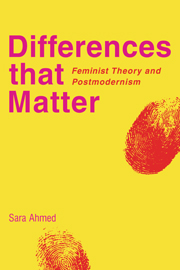4 - Subjects
Published online by Cambridge University Press: 22 September 2009
Summary
If postmodernism is, as Lyotard argues, a crisis of legitimation, then that crisis has been most consistently expressed as a crisis of the founding subject of modernity. Indeed, perhaps crisis is too weak a term here: an association has been set up between postmodernism and Death (the Death of the subject) such that the paradoxical question, ‘who comes after the subject’, is askable. This crisis or Death of the subject is a way of signalling the effect of a substantive theoretical interrogation of Enlightenment assumptions of an instrumental relation of subject to object world, the dichotomy of mind and body, the predication of identity on rationality, and a consciousness that is fully autonomous and present to itself. The crisis of the subject is precisely a crisis of the Cogito: ‘I think therefore I am.’ If postmodernism signals a shift from a model of the subject as disembodied, unified and rational, and towards a model of the subject as textual, contradictory and in-process, then surely postmodernism and feminism have more than some-Thing in common? Doesn't feminism's critique of the modern rational subject as predicated on masculinity mean that feminism is part of this general postmodern onslaught?
Of course, such questions are difficult, if not impossible, to answer without considering the role and effect of psychoanalysis on this challenge to the unified, self-present subject of modernity. Psychoanalysis provides the critical horizon in which the question of the subject returns to the subject as a division within it-self.
- Type
- Chapter
- Information
- Differences that MatterFeminist Theory and Postmodernism, pp. 94 - 118Publisher: Cambridge University PressPrint publication year: 1998



